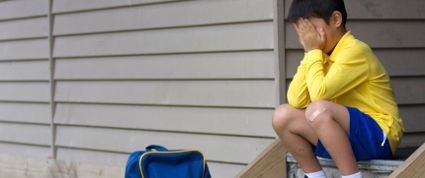
We all know what a bully is? And as parents we worry about our children being bullied. Bullying not only has effects on children's mental well-being, it can also cause physical symptoms. If you've noticed a change in your child's mood or behavior or suspect that he might be being bullied, the first thing you should do is talk to your child. Sometimes kids don't come to you with their problems, but dealing with bullying starts with communication.
Physical signs and symptoms of bullying
- lost or stolen items
-injuries
-headaches
-stomachaches
-feeling sick before school
-loss of friends
-unexplained crying
-trouble sleeping
-bedwetting
-changes in grades or interest in school
-changes in mood
-not wanting to ride the school bus
If you suspect your child is being bullied, start by talking to him. Find out exactly what has been going on. Ask for as many details as you can so that you can be prepared to discuss this with the school's administration. Find out your school's anti-bullying policy and set up an appointment with the school's principal. Talk to the principal about what has been taken place and ask what can be done to stop the bullying. Work with your child, the principal and teachers to ensure the bullying is stopped.
Help your child to make friends. Having a support system at school and friends that like him, will help build his self-confidence and it may make it easier for him to deal with bullies. Encourage him to reach out to kids that like him and get to know them better. You can also ask the teacher to move his seating arrangement so that he is near kids he likes and not so close to the kids that have been bullying.
Encourage your child to talk to you about what is going on in school. If there are future incidents with bullying or the bullying isn't getting better, make sure your child knows to tell you about this. Talk to your child about what he has tried in the past to make the bullying stop and give him suggestions of your own on things he could try. Let him know that it's okay to tell someone about what's going on.
Make sure to keep the communication open with your child. If the bullying has had a significant affect on his well-being, you may want to consider working with a therapist to help him through these feelings. Also, most child therapists are trained on how to deal with bullies and may be able to help your child with a strategies for dealing with bullying situations. For example, tell a teacher, walk away, or stay near your friends that like you.
